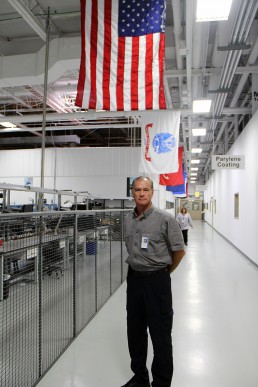
Joe Winkelmann
We Are SCI
When his career came full circle, Joe Winkelmann was in one of the places he feels most comfortable. That is to say, he was surrounded by other military people.
It was just before Labor Day in 2014, and the retired Army Captain was finishing a workout on Redstone Arsenal. In recent weeks, he had been considering a return to Afghanistan and another stint with the U.S. Embassy in Kabul. Then SCI called.
“I was getting dressed in the locker room and the phone rang, and it was HR calling and offering me the position,” Joe says. “It was kind of weird because I started here (at SCI), went into the military, and now I’m back here after 30 years.”
When he first came to SCI in the mid-1980s, Joe worked as a QA Inspector while he attended UAH. These days he is Facility Security Supervisor, a role that requires him to manage a guard force and oversee all physical security on SCI and Sanmina’s sprawling campus.
To understand exactly how Joe made such a transition, you have to travel back to the time before everything came full circle. It’s a 30-year journey that ranges from Alabama and Georgia to Iraq and Afghanistan. And along the way, it involves the heartbreak of a Gold Star Family.
Ft. Benning to Baghdad and Back
The son of a Senior Executive Service (SES) Officer on Redstone Arsenal, Joe began his military service as an air traffic control tower operator in the U.S. Army. His career took its first turn when he attended Officer Candidate School (OCS) at Fort Benning in Georgia and became a Field Artillery Officer.
As part of the invading force that took Baghdad during Desert Storm, Joe then saw his career take another turn upon reaching the Iraqi capital.
“You can’t really fire artillery inside of a big city – it’s ineffective. So they made me the Battle Captain in charge of security at Baghdad International Airport,” Joe says. “So that’s where I got my interest in security.”
While still in the Army, Joe furthered that interest by completing a Master’s degree in Security Management. He later retired as an OCS instructor back at Ft. Benning, where he had earned his own commission years earlier.
“If you’re in the military for 20 years, it’s really your lifestyle. You’re so used to supporting the country, being part of the cause."
Part of the Cause
Following his military retirement, Joe worked as a Security Supervisor contractor for the U.S. Embassy in Kabul. Back in Alabama in 2014, he was on the verge of returning to Afghanistan when SCI called.
He immediately knew it would be a good fit.
“If you’re in the military for 20 years, it’s really your lifestyle. You’re so used to supporting the country, being part of the cause,” Joe says. “To come to a place like SCI, where we’re doing these kinds of military projects, and I actually see the aircraft and vehicles that I rode in and flew in, it gives you a sense of pride that you’re still part of the overall military war fighting capability – but you’re doing it from a different perspective.”
Being part of the cause holds a very personal meaning for Joe, whose son, Ryan Joseph, was killed while serving in the Army as an Infantry Sergeant. But while the heartbreak from that loss might never fully heal, taking a job in Huntsville meant Joe could spend time with his son’s son.
Now 4 years old, he lives not far from Joe’s work.
A Different Kind of Culture
In his duties with SCI, Joe oversees what he calls a “very, very professional guard force.” Many of its members are retired police, military or both – which makes for a great work environment.
“I think it’s because of the guys on the team,” he says. “They have such similar backgrounds in law enforcement and military that they really understand the team concept and working as a team to support each other in a potentially dangerous situation.”
When he’s not at SCI, Joe is most likely spending time with his family. His parents, brother and sister all live in town, and his twin son and daughter are seniors at Grissom High. The latter recently accepted an academic scholarship to attend the University of Alabama.
But when he gets the chance, Joe also likes to return to Redstone Arsenal. The reason, he says, is simple.
“Just about everything I do is either here (at SCI), at home, or on the Arsenal,” Joe says. “It’s just a different kind of culture. And we have a lot of military guys here, so we’re able to communicate really well and work really well together also.”


